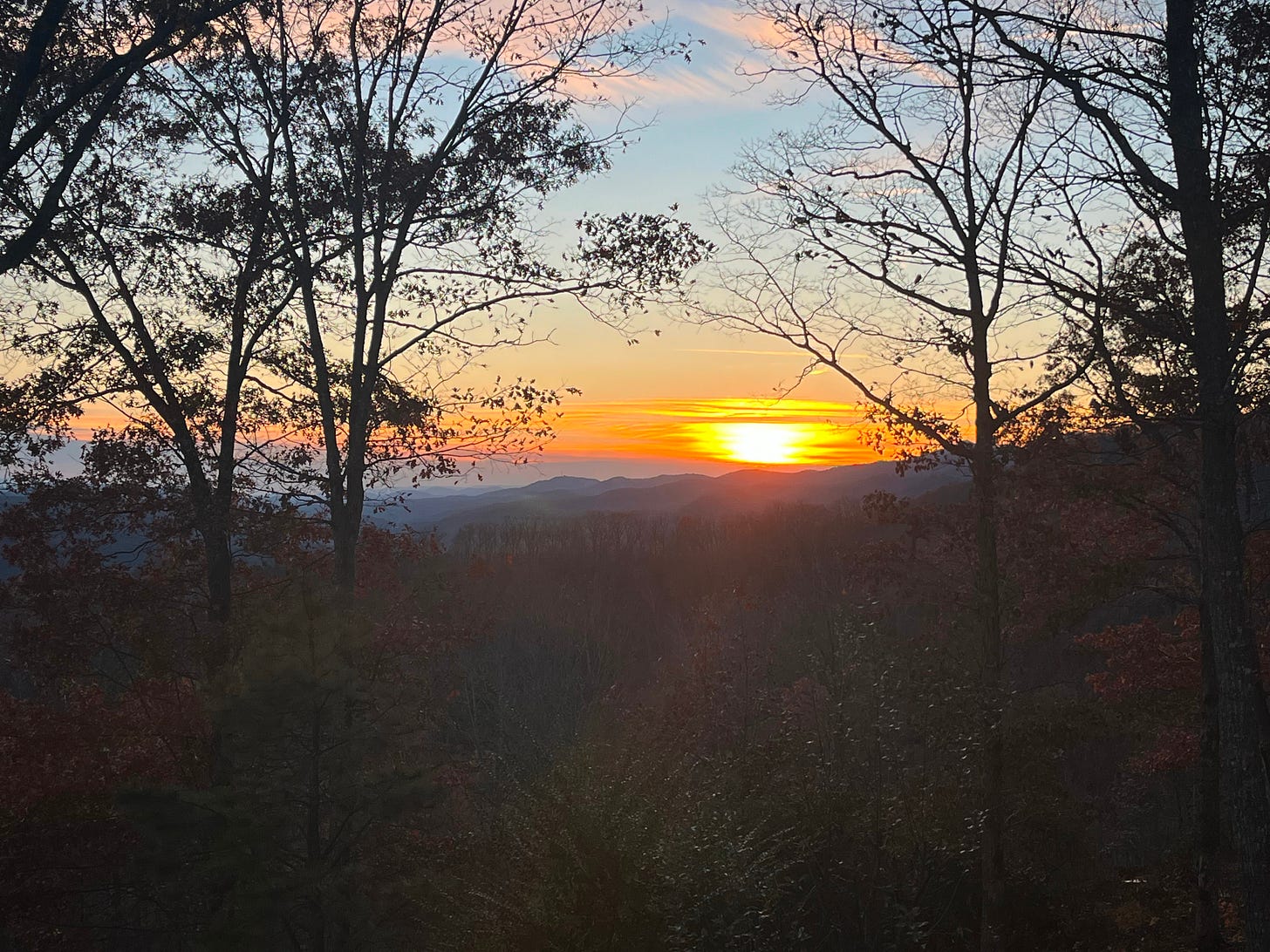November was a roller coaster of a month (which I feel like I say, I don’t know, most months?) - personally, professionally, nationally, globally. There was so much to be grateful for, and so much to fear. I’ve been thinking a lot about the yoga niyama (an observance or guidline) ishvara pranidhana, which can be translated a variety of ways, including “spiritual surrender” or “merging with the divine.” Of the yogic principles, this is probably the one that made me (a stoic, agnostic-adjacent midwesterner) most uncomfortable as I moved through my yoga teacher training. I almost had a grasp on it when it came to “release of expectations,” but it wasn’t until my teacher offered another definition, “giving it up for the collective” that I could exhale and actually engage with what this practice is asking.
Surrender, for me, looks a lot like accepting the reality of a frustrating situation without giving up the agency I have to make progress with it. It looks like letting walls around feeling or reaction fall to actually experience whatever the thing is (positive, negative, or neutral) rather than trying to micro-manage my experience of it. It looks like embracing the not knowing rather than fighting it.
In November, I surrendered to:
A transformational experience at a P!nk concert
The way my body feels different when I’m around oaks and maples rather than sagebrush and agave.
The uncertainty of the best way to prioritize community care as we face four more years of an unstable, untenable national political situation, and the commitment to keep trying.
The reality that sometimes love for my students looks like holding them accountable for work they have not completed, even when it doesn’t make them (or me) feel good in the short-term.
The reality that I was going to work while I was sick (not contagious, but not well) because three subs in my hallway was already too many (the collective), and also that I was going directly home after school and going straight to bed for two weeks in a row (just for me).
Continuing to work on asanas that frustrate me without pushing so hard that it puts my mind in an antithetical-to-yoga place.
It’s interesting that a lot of these involve balance - I’m surrendering to the reality without giving up, I’m accepting a setback without throwing a fit, I’m softening the edges of my expectations without letting go of them entirely. I’m not exactly sure how this all fits within the historical definition of ishvara pranidhana; I’m not sure that I’ll ever really understand that, but I do know that I’m continuing to sit with it.
As someone (perfectionist Gemini sun/Capricorn rising only child) very prone to both throwing up my hands at the first sign of struggle AND holding onto ideas long past their point of utility, ishvara pranidhana seems to ask me to surrender to a type of contradiction and messiness that does not come naturally to my physical, mental, and cultural makeup.
One of the ways I understood my teacher’s explanation of “giving it up for the collective” was a refutation of the idea that yoga is solely personal healing work. Of course it is that, but if my yoga never leaves my mat, I’m missing the point. With the belief that there is light in everyone, the divine everywhere, connecting to others (people, the natural world, which are of course, one and the same) almost has to be part of surrender; we surrender to the light and our part in it and its part in others.
I worked with a yoga teacher I don’t get to see very often this week, and had to preface that time by saying, “I’m still dealing with an upper respiratory situation that is now three weeks old. I did a vinyasa class yesterday, and it was okay, so I assume this will be okay, too, but if I start coughing I’m sorry, and I promise I’m not contagious.” In a single breath, she taught me something about surrender: “That cough’s going to show up in savasana. That’s why, in autumn, we all live on bolsters. Let’s get started.”
Instead of fighting the reality that everyone’s sick this time of year, or holding rigid to an expectation of what rest “should” look like, or adjusting what we planned to do that day, she simply made me feel seen and at ease about not being in peak form, let me know that I was not alone, and signaled a way forward anyway.
It was such an example of care, seemingly effortless on her part, but it left me breathless for a moment in both its simplicity and profundity. Later in that same week, I struggled to keep pace with my hiking partners up a 12% grade hill (altitude and common colds are no joke, and hiking with runners is a questionable choice). While I was able to get my body to surrender to resting halfway, my ego was disinclined to follow. Someone else who had paused said, “man, this hill is steep,” signaling a sense of being in the struggle together and, when I was ready to move on, said, “I’ll see you at the top,” a reminder that surrender to reality doesn’t mean giving up. By setting down the need to fight reality, we can preserve our energy for fighting the real battles, the ones preserving light and love and dignity, be those within ourselves or within the world.
I’d love to hear what you’ve surrendered to, or what you could use to surrender to, or anything, truly, that you loved or found joy in during November.
After being able to teach only one class in November, I have FIVE on the calendar for December. The winter solstice workshop is one of my favorite classes, and it’s a great way to rest and recover (specifically for teachers!) or to recharge before the holidays. Click below to register for any classes!






